Contemporary Issues in Accounting: Environmental Accounting Focus
VerifiedAdded on 2022/12/30
|17
|3309
|31
Report
AI Summary
This research proposal delves into contemporary issues in accounting, specifically highlighting the unaccountability of environmental factors within traditional financial accounting practices. The paper emphasizes the significance of environmental accounting, presenting a general introduction, practical and theoretical motivations, and a comprehensive literature review. It explores the deficiencies of traditional accounting systems in addressing environmental concerns, emphasizing the importance of incorporating environmental factors for managers, accountants, and regulators. The theoretical motivation centers on environmental management systems, while practical motivation highlights the impact of environmental disasters and the need for sustainability. The literature review examines existing research on corporate social and environmental reporting, challenges faced by traditional accounting, and the impact of environmental management accounting in Europe. The proposal concludes with a hypothesis suggesting a negative impact of unaccounted environmental factors on financial health, along with a description of the proposed research methodology, which will utilize both primary and secondary data to investigate the issue further.
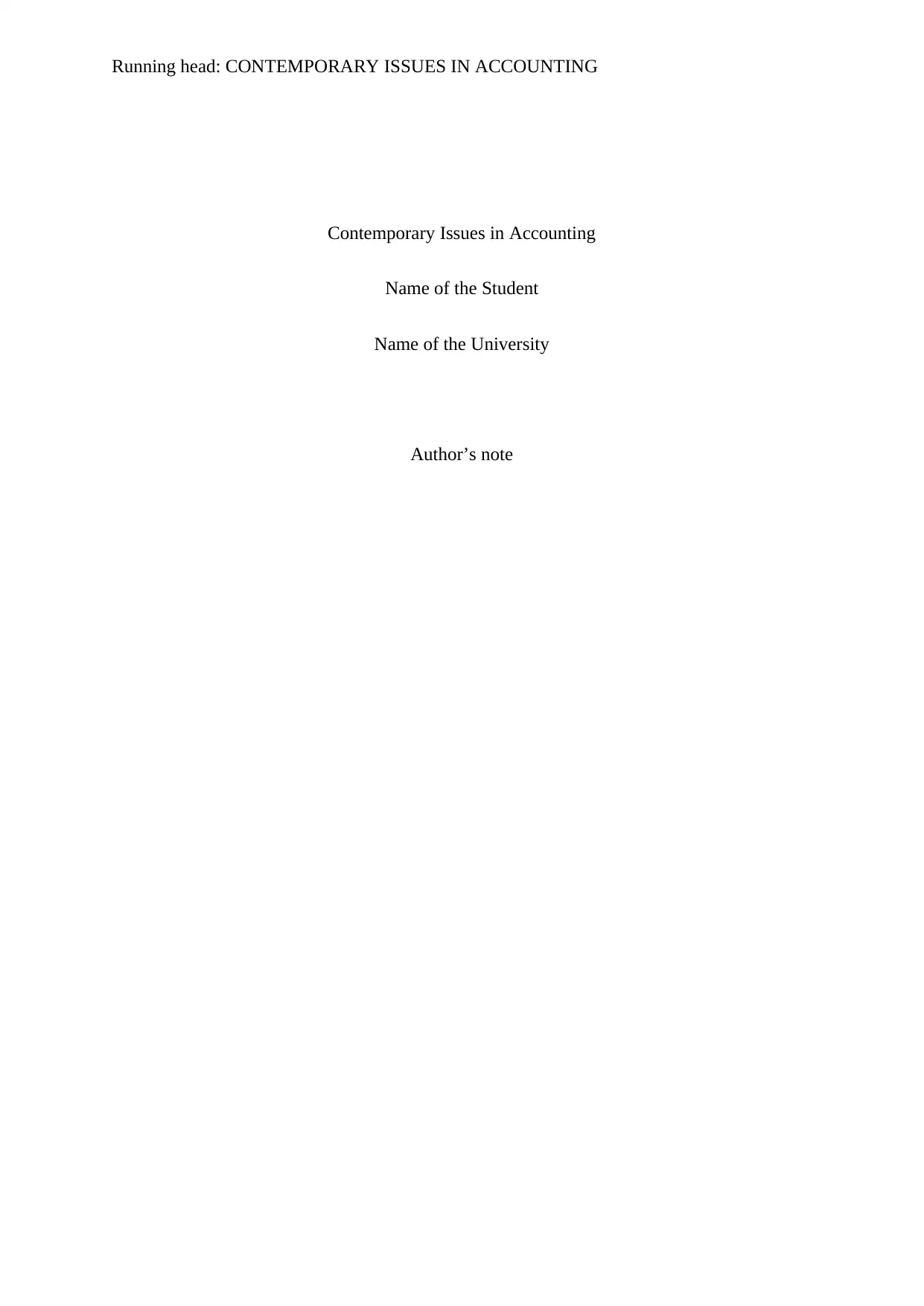
Running head: CONTEMPORARY ISSUES IN ACCOUNTING
Contemporary Issues in Accounting
Name of the Student
Name of the University
Author’s note
Contemporary Issues in Accounting
Name of the Student
Name of the University
Author’s note
Paraphrase This Document
Need a fresh take? Get an instant paraphrase of this document with our AI Paraphraser
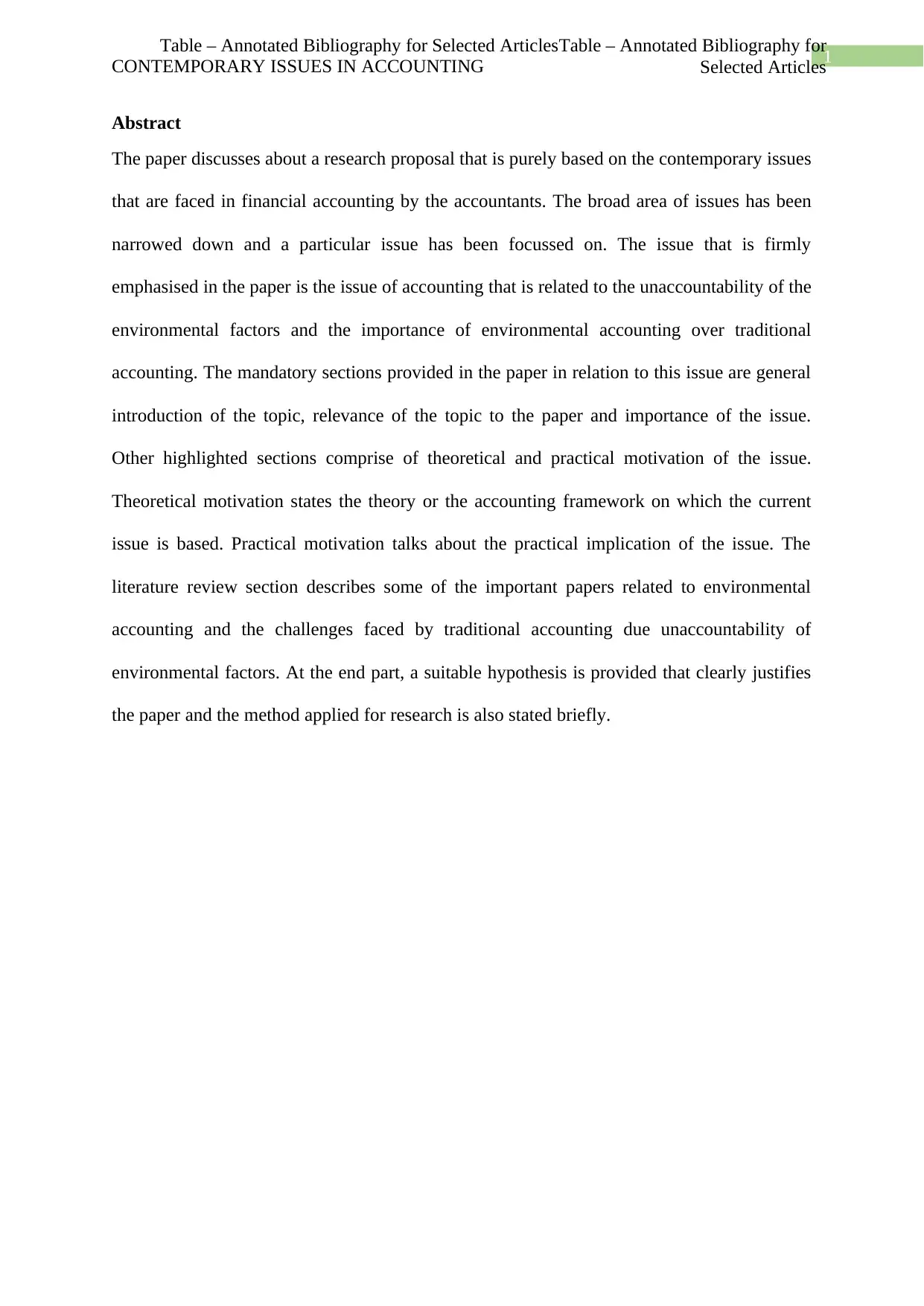
1
Table – Annotated Bibliography for Selected ArticlesTable – Annotated Bibliography for
Selected ArticlesCONTEMPORARY ISSUES IN ACCOUNTING
Abstract
The paper discusses about a research proposal that is purely based on the contemporary issues
that are faced in financial accounting by the accountants. The broad area of issues has been
narrowed down and a particular issue has been focussed on. The issue that is firmly
emphasised in the paper is the issue of accounting that is related to the unaccountability of the
environmental factors and the importance of environmental accounting over traditional
accounting. The mandatory sections provided in the paper in relation to this issue are general
introduction of the topic, relevance of the topic to the paper and importance of the issue.
Other highlighted sections comprise of theoretical and practical motivation of the issue.
Theoretical motivation states the theory or the accounting framework on which the current
issue is based. Practical motivation talks about the practical implication of the issue. The
literature review section describes some of the important papers related to environmental
accounting and the challenges faced by traditional accounting due unaccountability of
environmental factors. At the end part, a suitable hypothesis is provided that clearly justifies
the paper and the method applied for research is also stated briefly.
Table – Annotated Bibliography for Selected ArticlesTable – Annotated Bibliography for
Selected ArticlesCONTEMPORARY ISSUES IN ACCOUNTING
Abstract
The paper discusses about a research proposal that is purely based on the contemporary issues
that are faced in financial accounting by the accountants. The broad area of issues has been
narrowed down and a particular issue has been focussed on. The issue that is firmly
emphasised in the paper is the issue of accounting that is related to the unaccountability of the
environmental factors and the importance of environmental accounting over traditional
accounting. The mandatory sections provided in the paper in relation to this issue are general
introduction of the topic, relevance of the topic to the paper and importance of the issue.
Other highlighted sections comprise of theoretical and practical motivation of the issue.
Theoretical motivation states the theory or the accounting framework on which the current
issue is based. Practical motivation talks about the practical implication of the issue. The
literature review section describes some of the important papers related to environmental
accounting and the challenges faced by traditional accounting due unaccountability of
environmental factors. At the end part, a suitable hypothesis is provided that clearly justifies
the paper and the method applied for research is also stated briefly.
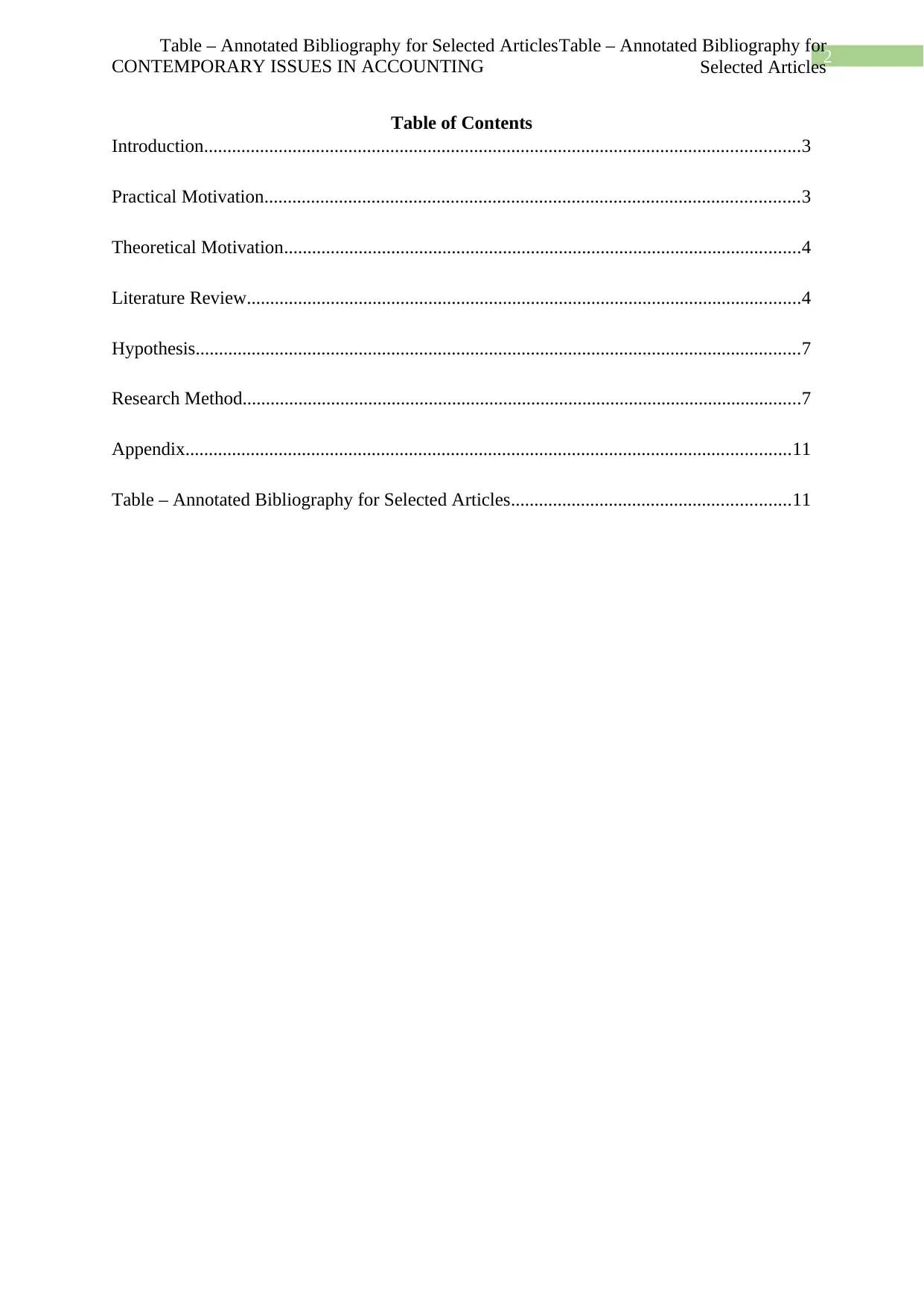
2
Table – Annotated Bibliography for Selected ArticlesTable – Annotated Bibliography for
Selected ArticlesCONTEMPORARY ISSUES IN ACCOUNTING
Table of Contents
Introduction................................................................................................................................3
Practical Motivation...................................................................................................................3
Theoretical Motivation...............................................................................................................4
Literature Review.......................................................................................................................4
Hypothesis..................................................................................................................................7
Research Method........................................................................................................................7
Appendix..................................................................................................................................11
Table – Annotated Bibliography for Selected Articles............................................................11
Table – Annotated Bibliography for Selected ArticlesTable – Annotated Bibliography for
Selected ArticlesCONTEMPORARY ISSUES IN ACCOUNTING
Table of Contents
Introduction................................................................................................................................3
Practical Motivation...................................................................................................................3
Theoretical Motivation...............................................................................................................4
Literature Review.......................................................................................................................4
Hypothesis..................................................................................................................................7
Research Method........................................................................................................................7
Appendix..................................................................................................................................11
Table – Annotated Bibliography for Selected Articles............................................................11
⊘ This is a preview!⊘
Do you want full access?
Subscribe today to unlock all pages.

Trusted by 1+ million students worldwide
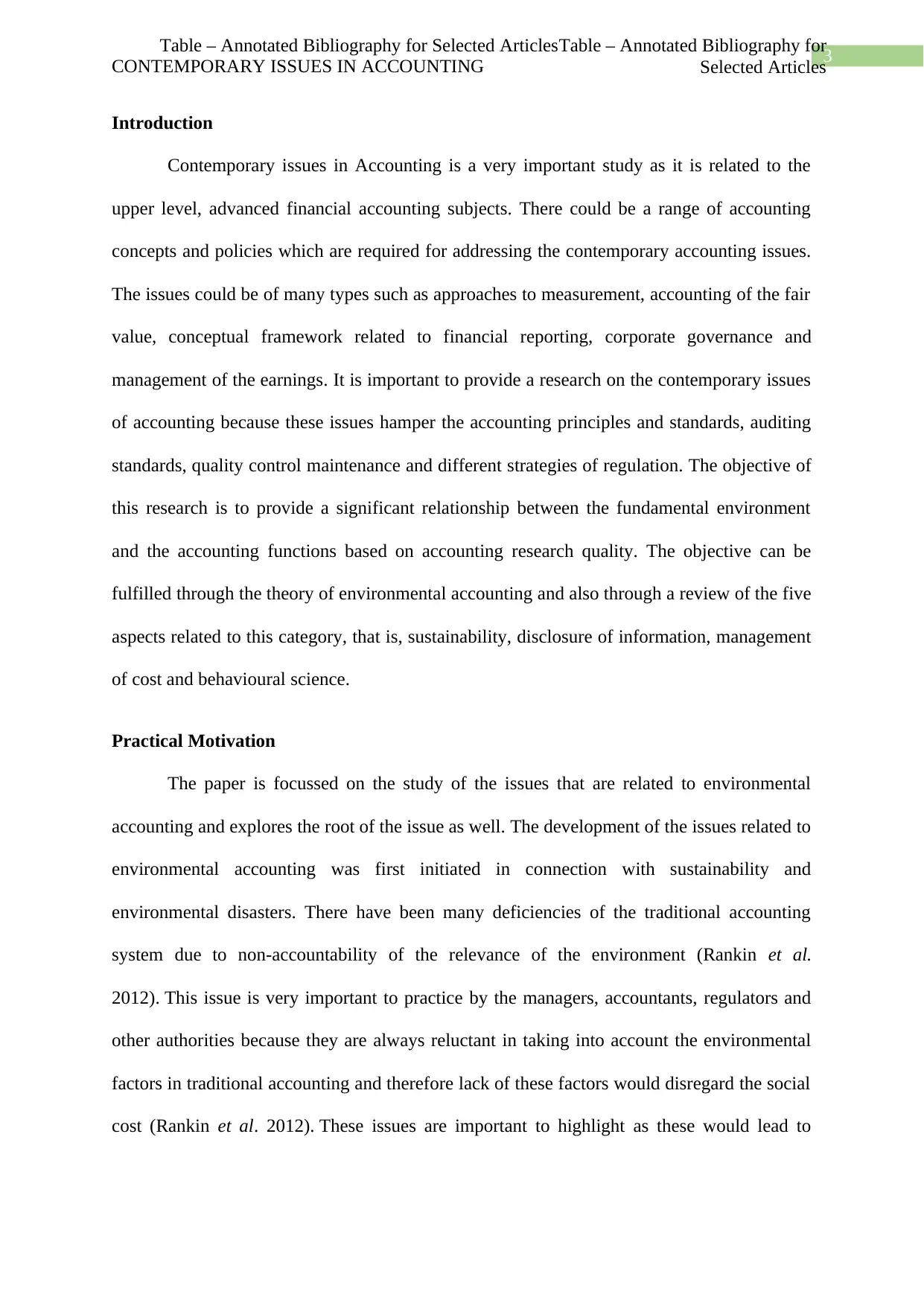
3
Table – Annotated Bibliography for Selected ArticlesTable – Annotated Bibliography for
Selected ArticlesCONTEMPORARY ISSUES IN ACCOUNTING
Introduction
Contemporary issues in Accounting is a very important study as it is related to the
upper level, advanced financial accounting subjects. There could be a range of accounting
concepts and policies which are required for addressing the contemporary accounting issues.
The issues could be of many types such as approaches to measurement, accounting of the fair
value, conceptual framework related to financial reporting, corporate governance and
management of the earnings. It is important to provide a research on the contemporary issues
of accounting because these issues hamper the accounting principles and standards, auditing
standards, quality control maintenance and different strategies of regulation. The objective of
this research is to provide a significant relationship between the fundamental environment
and the accounting functions based on accounting research quality. The objective can be
fulfilled through the theory of environmental accounting and also through a review of the five
aspects related to this category, that is, sustainability, disclosure of information, management
of cost and behavioural science.
Practical Motivation
The paper is focussed on the study of the issues that are related to environmental
accounting and explores the root of the issue as well. The development of the issues related to
environmental accounting was first initiated in connection with sustainability and
environmental disasters. There have been many deficiencies of the traditional accounting
system due to non-accountability of the relevance of the environment (Rankin et al.
2012). This issue is very important to practice by the managers, accountants, regulators and
other authorities because they are always reluctant in taking into account the environmental
factors in traditional accounting and therefore lack of these factors would disregard the social
cost (Rankin et al. 2012). These issues are important to highlight as these would lead to
Table – Annotated Bibliography for Selected ArticlesTable – Annotated Bibliography for
Selected ArticlesCONTEMPORARY ISSUES IN ACCOUNTING
Introduction
Contemporary issues in Accounting is a very important study as it is related to the
upper level, advanced financial accounting subjects. There could be a range of accounting
concepts and policies which are required for addressing the contemporary accounting issues.
The issues could be of many types such as approaches to measurement, accounting of the fair
value, conceptual framework related to financial reporting, corporate governance and
management of the earnings. It is important to provide a research on the contemporary issues
of accounting because these issues hamper the accounting principles and standards, auditing
standards, quality control maintenance and different strategies of regulation. The objective of
this research is to provide a significant relationship between the fundamental environment
and the accounting functions based on accounting research quality. The objective can be
fulfilled through the theory of environmental accounting and also through a review of the five
aspects related to this category, that is, sustainability, disclosure of information, management
of cost and behavioural science.
Practical Motivation
The paper is focussed on the study of the issues that are related to environmental
accounting and explores the root of the issue as well. The development of the issues related to
environmental accounting was first initiated in connection with sustainability and
environmental disasters. There have been many deficiencies of the traditional accounting
system due to non-accountability of the relevance of the environment (Rankin et al.
2012). This issue is very important to practice by the managers, accountants, regulators and
other authorities because they are always reluctant in taking into account the environmental
factors in traditional accounting and therefore lack of these factors would disregard the social
cost (Rankin et al. 2012). These issues are important to highlight as these would lead to
Paraphrase This Document
Need a fresh take? Get an instant paraphrase of this document with our AI Paraphraser
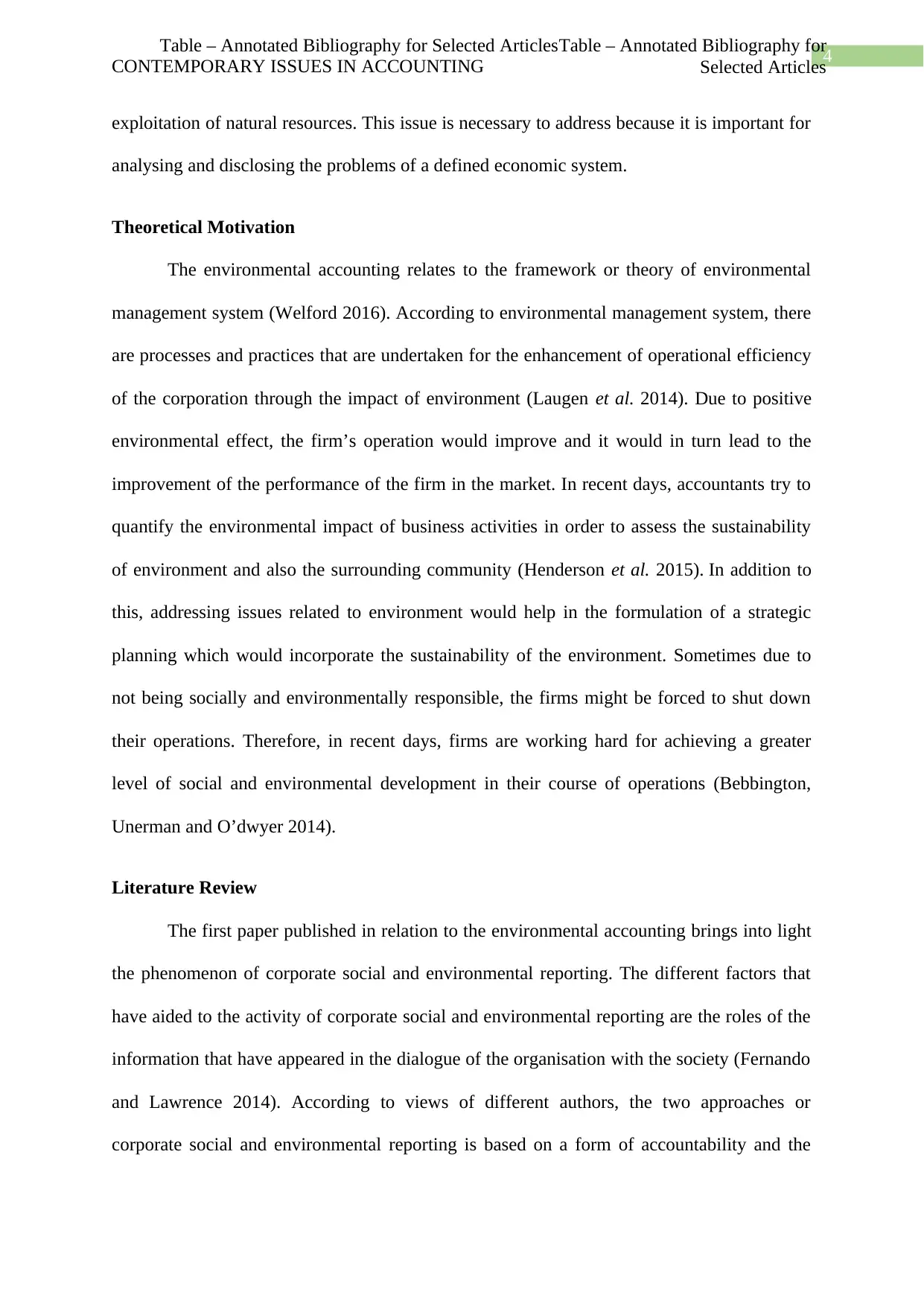
4
Table – Annotated Bibliography for Selected ArticlesTable – Annotated Bibliography for
Selected ArticlesCONTEMPORARY ISSUES IN ACCOUNTING
exploitation of natural resources. This issue is necessary to address because it is important for
analysing and disclosing the problems of a defined economic system.
Theoretical Motivation
The environmental accounting relates to the framework or theory of environmental
management system (Welford 2016). According to environmental management system, there
are processes and practices that are undertaken for the enhancement of operational efficiency
of the corporation through the impact of environment (Laugen et al. 2014). Due to positive
environmental effect, the firm’s operation would improve and it would in turn lead to the
improvement of the performance of the firm in the market. In recent days, accountants try to
quantify the environmental impact of business activities in order to assess the sustainability
of environment and also the surrounding community (Henderson et al. 2015). In addition to
this, addressing issues related to environment would help in the formulation of a strategic
planning which would incorporate the sustainability of the environment. Sometimes due to
not being socially and environmentally responsible, the firms might be forced to shut down
their operations. Therefore, in recent days, firms are working hard for achieving a greater
level of social and environmental development in their course of operations (Bebbington,
Unerman and O’dwyer 2014).
Literature Review
The first paper published in relation to the environmental accounting brings into light
the phenomenon of corporate social and environmental reporting. The different factors that
have aided to the activity of corporate social and environmental reporting are the roles of the
information that have appeared in the dialogue of the organisation with the society (Fernando
and Lawrence 2014). According to views of different authors, the two approaches or
corporate social and environmental reporting is based on a form of accountability and the
Table – Annotated Bibliography for Selected ArticlesTable – Annotated Bibliography for
Selected ArticlesCONTEMPORARY ISSUES IN ACCOUNTING
exploitation of natural resources. This issue is necessary to address because it is important for
analysing and disclosing the problems of a defined economic system.
Theoretical Motivation
The environmental accounting relates to the framework or theory of environmental
management system (Welford 2016). According to environmental management system, there
are processes and practices that are undertaken for the enhancement of operational efficiency
of the corporation through the impact of environment (Laugen et al. 2014). Due to positive
environmental effect, the firm’s operation would improve and it would in turn lead to the
improvement of the performance of the firm in the market. In recent days, accountants try to
quantify the environmental impact of business activities in order to assess the sustainability
of environment and also the surrounding community (Henderson et al. 2015). In addition to
this, addressing issues related to environment would help in the formulation of a strategic
planning which would incorporate the sustainability of the environment. Sometimes due to
not being socially and environmentally responsible, the firms might be forced to shut down
their operations. Therefore, in recent days, firms are working hard for achieving a greater
level of social and environmental development in their course of operations (Bebbington,
Unerman and O’dwyer 2014).
Literature Review
The first paper published in relation to the environmental accounting brings into light
the phenomenon of corporate social and environmental reporting. The different factors that
have aided to the activity of corporate social and environmental reporting are the roles of the
information that have appeared in the dialogue of the organisation with the society (Fernando
and Lawrence 2014). According to views of different authors, the two approaches or
corporate social and environmental reporting is based on a form of accountability and the
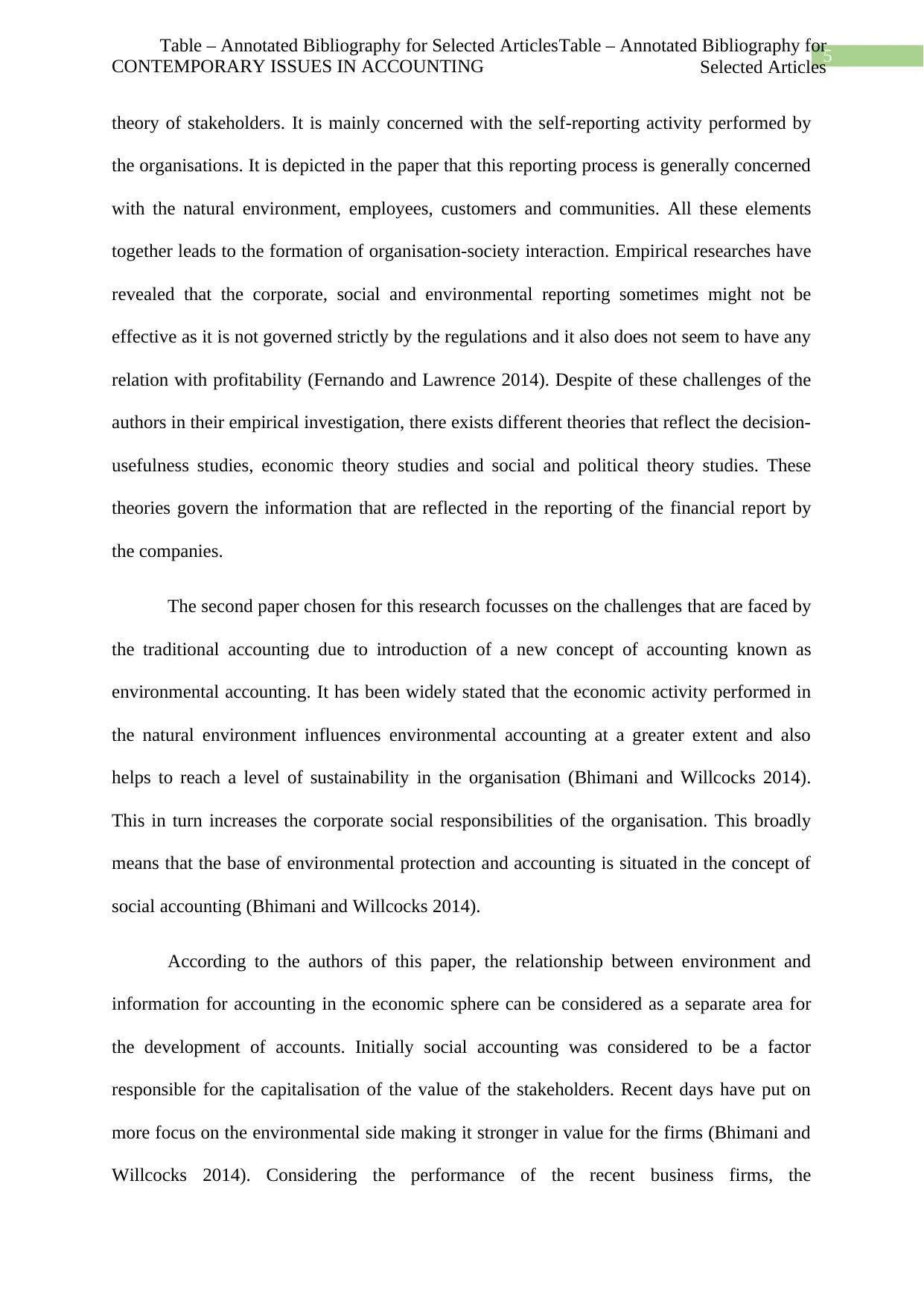
5
Table – Annotated Bibliography for Selected ArticlesTable – Annotated Bibliography for
Selected ArticlesCONTEMPORARY ISSUES IN ACCOUNTING
theory of stakeholders. It is mainly concerned with the self-reporting activity performed by
the organisations. It is depicted in the paper that this reporting process is generally concerned
with the natural environment, employees, customers and communities. All these elements
together leads to the formation of organisation-society interaction. Empirical researches have
revealed that the corporate, social and environmental reporting sometimes might not be
effective as it is not governed strictly by the regulations and it also does not seem to have any
relation with profitability (Fernando and Lawrence 2014). Despite of these challenges of the
authors in their empirical investigation, there exists different theories that reflect the decision-
usefulness studies, economic theory studies and social and political theory studies. These
theories govern the information that are reflected in the reporting of the financial report by
the companies.
The second paper chosen for this research focusses on the challenges that are faced by
the traditional accounting due to introduction of a new concept of accounting known as
environmental accounting. It has been widely stated that the economic activity performed in
the natural environment influences environmental accounting at a greater extent and also
helps to reach a level of sustainability in the organisation (Bhimani and Willcocks 2014).
This in turn increases the corporate social responsibilities of the organisation. This broadly
means that the base of environmental protection and accounting is situated in the concept of
social accounting (Bhimani and Willcocks 2014).
According to the authors of this paper, the relationship between environment and
information for accounting in the economic sphere can be considered as a separate area for
the development of accounts. Initially social accounting was considered to be a factor
responsible for the capitalisation of the value of the stakeholders. Recent days have put on
more focus on the environmental side making it stronger in value for the firms (Bhimani and
Willcocks 2014). Considering the performance of the recent business firms, the
Table – Annotated Bibliography for Selected ArticlesTable – Annotated Bibliography for
Selected ArticlesCONTEMPORARY ISSUES IN ACCOUNTING
theory of stakeholders. It is mainly concerned with the self-reporting activity performed by
the organisations. It is depicted in the paper that this reporting process is generally concerned
with the natural environment, employees, customers and communities. All these elements
together leads to the formation of organisation-society interaction. Empirical researches have
revealed that the corporate, social and environmental reporting sometimes might not be
effective as it is not governed strictly by the regulations and it also does not seem to have any
relation with profitability (Fernando and Lawrence 2014). Despite of these challenges of the
authors in their empirical investigation, there exists different theories that reflect the decision-
usefulness studies, economic theory studies and social and political theory studies. These
theories govern the information that are reflected in the reporting of the financial report by
the companies.
The second paper chosen for this research focusses on the challenges that are faced by
the traditional accounting due to introduction of a new concept of accounting known as
environmental accounting. It has been widely stated that the economic activity performed in
the natural environment influences environmental accounting at a greater extent and also
helps to reach a level of sustainability in the organisation (Bhimani and Willcocks 2014).
This in turn increases the corporate social responsibilities of the organisation. This broadly
means that the base of environmental protection and accounting is situated in the concept of
social accounting (Bhimani and Willcocks 2014).
According to the authors of this paper, the relationship between environment and
information for accounting in the economic sphere can be considered as a separate area for
the development of accounts. Initially social accounting was considered to be a factor
responsible for the capitalisation of the value of the stakeholders. Recent days have put on
more focus on the environmental side making it stronger in value for the firms (Bhimani and
Willcocks 2014). Considering the performance of the recent business firms, the
⊘ This is a preview!⊘
Do you want full access?
Subscribe today to unlock all pages.

Trusted by 1+ million students worldwide
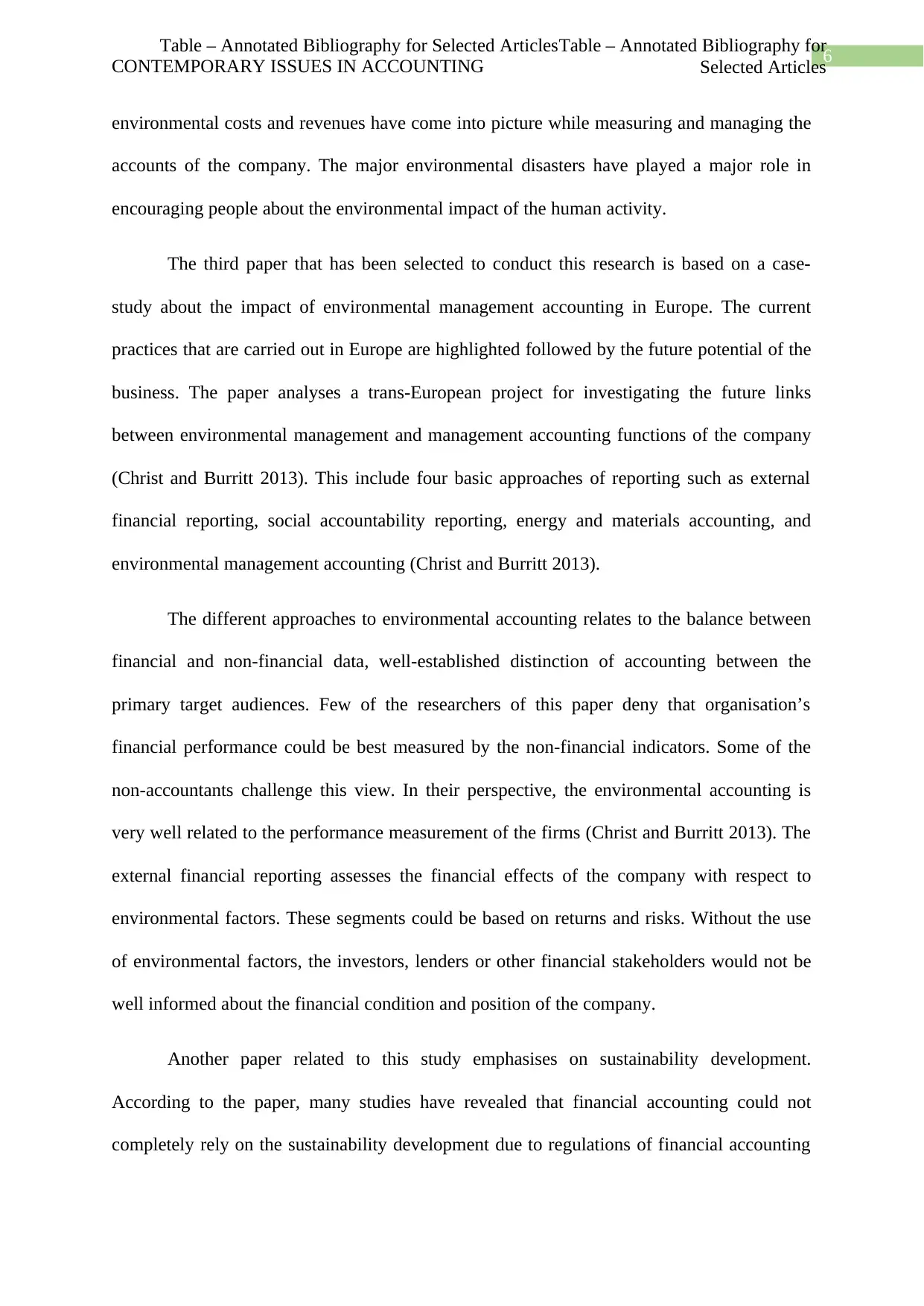
6
Table – Annotated Bibliography for Selected ArticlesTable – Annotated Bibliography for
Selected ArticlesCONTEMPORARY ISSUES IN ACCOUNTING
environmental costs and revenues have come into picture while measuring and managing the
accounts of the company. The major environmental disasters have played a major role in
encouraging people about the environmental impact of the human activity.
The third paper that has been selected to conduct this research is based on a case-
study about the impact of environmental management accounting in Europe. The current
practices that are carried out in Europe are highlighted followed by the future potential of the
business. The paper analyses a trans-European project for investigating the future links
between environmental management and management accounting functions of the company
(Christ and Burritt 2013). This include four basic approaches of reporting such as external
financial reporting, social accountability reporting, energy and materials accounting, and
environmental management accounting (Christ and Burritt 2013).
The different approaches to environmental accounting relates to the balance between
financial and non-financial data, well-established distinction of accounting between the
primary target audiences. Few of the researchers of this paper deny that organisation’s
financial performance could be best measured by the non-financial indicators. Some of the
non-accountants challenge this view. In their perspective, the environmental accounting is
very well related to the performance measurement of the firms (Christ and Burritt 2013). The
external financial reporting assesses the financial effects of the company with respect to
environmental factors. These segments could be based on returns and risks. Without the use
of environmental factors, the investors, lenders or other financial stakeholders would not be
well informed about the financial condition and position of the company.
Another paper related to this study emphasises on sustainability development.
According to the paper, many studies have revealed that financial accounting could not
completely rely on the sustainability development due to regulations of financial accounting
Table – Annotated Bibliography for Selected ArticlesTable – Annotated Bibliography for
Selected ArticlesCONTEMPORARY ISSUES IN ACCOUNTING
environmental costs and revenues have come into picture while measuring and managing the
accounts of the company. The major environmental disasters have played a major role in
encouraging people about the environmental impact of the human activity.
The third paper that has been selected to conduct this research is based on a case-
study about the impact of environmental management accounting in Europe. The current
practices that are carried out in Europe are highlighted followed by the future potential of the
business. The paper analyses a trans-European project for investigating the future links
between environmental management and management accounting functions of the company
(Christ and Burritt 2013). This include four basic approaches of reporting such as external
financial reporting, social accountability reporting, energy and materials accounting, and
environmental management accounting (Christ and Burritt 2013).
The different approaches to environmental accounting relates to the balance between
financial and non-financial data, well-established distinction of accounting between the
primary target audiences. Few of the researchers of this paper deny that organisation’s
financial performance could be best measured by the non-financial indicators. Some of the
non-accountants challenge this view. In their perspective, the environmental accounting is
very well related to the performance measurement of the firms (Christ and Burritt 2013). The
external financial reporting assesses the financial effects of the company with respect to
environmental factors. These segments could be based on returns and risks. Without the use
of environmental factors, the investors, lenders or other financial stakeholders would not be
well informed about the financial condition and position of the company.
Another paper related to this study emphasises on sustainability development.
According to the paper, many studies have revealed that financial accounting could not
completely rely on the sustainability development due to regulations of financial accounting
Paraphrase This Document
Need a fresh take? Get an instant paraphrase of this document with our AI Paraphraser
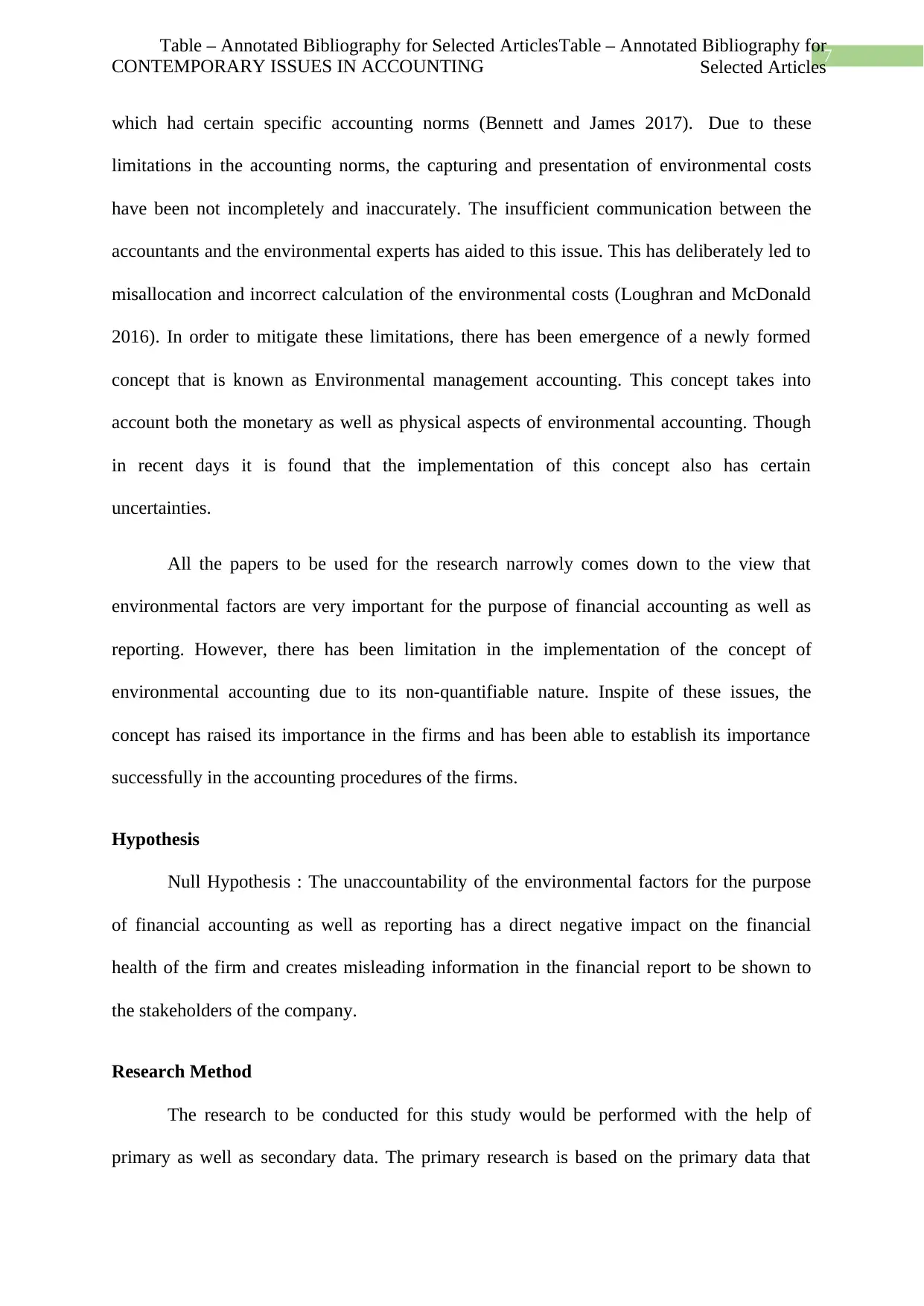
7
Table – Annotated Bibliography for Selected ArticlesTable – Annotated Bibliography for
Selected ArticlesCONTEMPORARY ISSUES IN ACCOUNTING
which had certain specific accounting norms (Bennett and James 2017). Due to these
limitations in the accounting norms, the capturing and presentation of environmental costs
have been not incompletely and inaccurately. The insufficient communication between the
accountants and the environmental experts has aided to this issue. This has deliberately led to
misallocation and incorrect calculation of the environmental costs (Loughran and McDonald
2016). In order to mitigate these limitations, there has been emergence of a newly formed
concept that is known as Environmental management accounting. This concept takes into
account both the monetary as well as physical aspects of environmental accounting. Though
in recent days it is found that the implementation of this concept also has certain
uncertainties.
All the papers to be used for the research narrowly comes down to the view that
environmental factors are very important for the purpose of financial accounting as well as
reporting. However, there has been limitation in the implementation of the concept of
environmental accounting due to its non-quantifiable nature. Inspite of these issues, the
concept has raised its importance in the firms and has been able to establish its importance
successfully in the accounting procedures of the firms.
Hypothesis
Null Hypothesis : The unaccountability of the environmental factors for the purpose
of financial accounting as well as reporting has a direct negative impact on the financial
health of the firm and creates misleading information in the financial report to be shown to
the stakeholders of the company.
Research Method
The research to be conducted for this study would be performed with the help of
primary as well as secondary data. The primary research is based on the primary data that
Table – Annotated Bibliography for Selected ArticlesTable – Annotated Bibliography for
Selected ArticlesCONTEMPORARY ISSUES IN ACCOUNTING
which had certain specific accounting norms (Bennett and James 2017). Due to these
limitations in the accounting norms, the capturing and presentation of environmental costs
have been not incompletely and inaccurately. The insufficient communication between the
accountants and the environmental experts has aided to this issue. This has deliberately led to
misallocation and incorrect calculation of the environmental costs (Loughran and McDonald
2016). In order to mitigate these limitations, there has been emergence of a newly formed
concept that is known as Environmental management accounting. This concept takes into
account both the monetary as well as physical aspects of environmental accounting. Though
in recent days it is found that the implementation of this concept also has certain
uncertainties.
All the papers to be used for the research narrowly comes down to the view that
environmental factors are very important for the purpose of financial accounting as well as
reporting. However, there has been limitation in the implementation of the concept of
environmental accounting due to its non-quantifiable nature. Inspite of these issues, the
concept has raised its importance in the firms and has been able to establish its importance
successfully in the accounting procedures of the firms.
Hypothesis
Null Hypothesis : The unaccountability of the environmental factors for the purpose
of financial accounting as well as reporting has a direct negative impact on the financial
health of the firm and creates misleading information in the financial report to be shown to
the stakeholders of the company.
Research Method
The research to be conducted for this study would be performed with the help of
primary as well as secondary data. The primary research is based on the primary data that
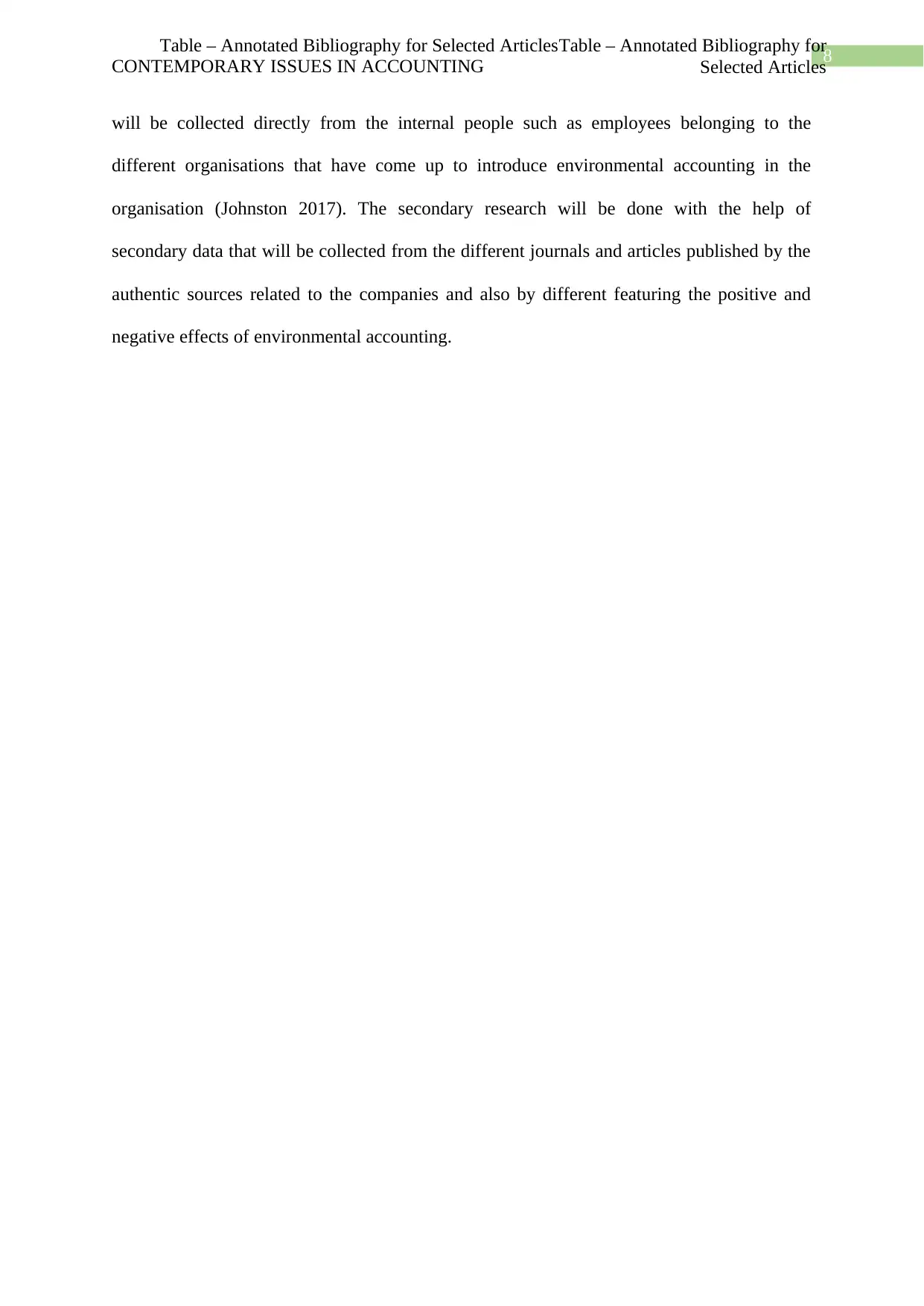
8
Table – Annotated Bibliography for Selected ArticlesTable – Annotated Bibliography for
Selected ArticlesCONTEMPORARY ISSUES IN ACCOUNTING
will be collected directly from the internal people such as employees belonging to the
different organisations that have come up to introduce environmental accounting in the
organisation (Johnston 2017). The secondary research will be done with the help of
secondary data that will be collected from the different journals and articles published by the
authentic sources related to the companies and also by different featuring the positive and
negative effects of environmental accounting.
Table – Annotated Bibliography for Selected ArticlesTable – Annotated Bibliography for
Selected ArticlesCONTEMPORARY ISSUES IN ACCOUNTING
will be collected directly from the internal people such as employees belonging to the
different organisations that have come up to introduce environmental accounting in the
organisation (Johnston 2017). The secondary research will be done with the help of
secondary data that will be collected from the different journals and articles published by the
authentic sources related to the companies and also by different featuring the positive and
negative effects of environmental accounting.
⊘ This is a preview!⊘
Do you want full access?
Subscribe today to unlock all pages.

Trusted by 1+ million students worldwide
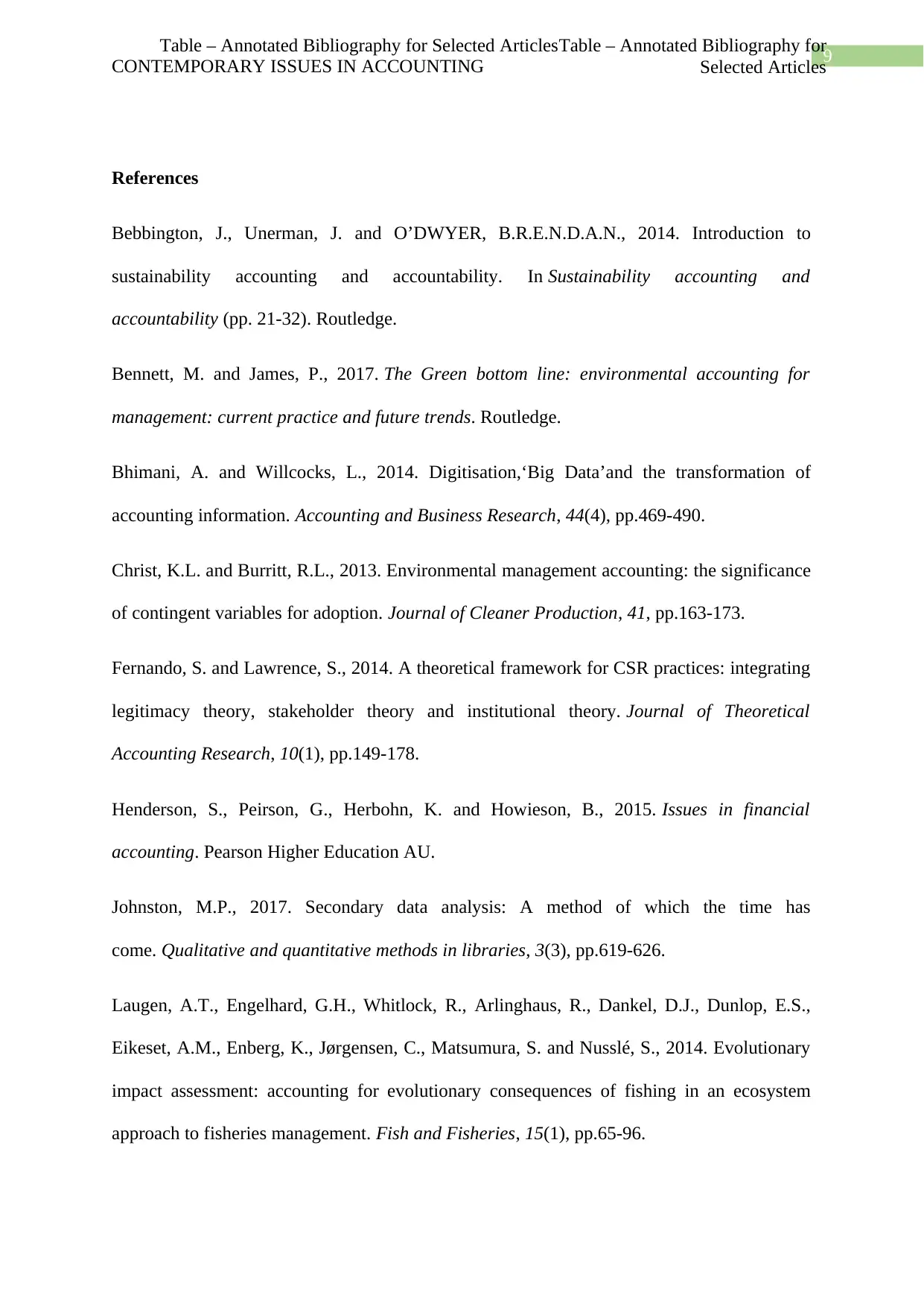
9
Table – Annotated Bibliography for Selected ArticlesTable – Annotated Bibliography for
Selected ArticlesCONTEMPORARY ISSUES IN ACCOUNTING
References
Bebbington, J., Unerman, J. and O’DWYER, B.R.E.N.D.A.N., 2014. Introduction to
sustainability accounting and accountability. In Sustainability accounting and
accountability (pp. 21-32). Routledge.
Bennett, M. and James, P., 2017. The Green bottom line: environmental accounting for
management: current practice and future trends. Routledge.
Bhimani, A. and Willcocks, L., 2014. Digitisation,‘Big Data’and the transformation of
accounting information. Accounting and Business Research, 44(4), pp.469-490.
Christ, K.L. and Burritt, R.L., 2013. Environmental management accounting: the significance
of contingent variables for adoption. Journal of Cleaner Production, 41, pp.163-173.
Fernando, S. and Lawrence, S., 2014. A theoretical framework for CSR practices: integrating
legitimacy theory, stakeholder theory and institutional theory. Journal of Theoretical
Accounting Research, 10(1), pp.149-178.
Henderson, S., Peirson, G., Herbohn, K. and Howieson, B., 2015. Issues in financial
accounting. Pearson Higher Education AU.
Johnston, M.P., 2017. Secondary data analysis: A method of which the time has
come. Qualitative and quantitative methods in libraries, 3(3), pp.619-626.
Laugen, A.T., Engelhard, G.H., Whitlock, R., Arlinghaus, R., Dankel, D.J., Dunlop, E.S.,
Eikeset, A.M., Enberg, K., Jørgensen, C., Matsumura, S. and Nusslé, S., 2014. Evolutionary
impact assessment: accounting for evolutionary consequences of fishing in an ecosystem
approach to fisheries management. Fish and Fisheries, 15(1), pp.65-96.
Table – Annotated Bibliography for Selected ArticlesTable – Annotated Bibliography for
Selected ArticlesCONTEMPORARY ISSUES IN ACCOUNTING
References
Bebbington, J., Unerman, J. and O’DWYER, B.R.E.N.D.A.N., 2014. Introduction to
sustainability accounting and accountability. In Sustainability accounting and
accountability (pp. 21-32). Routledge.
Bennett, M. and James, P., 2017. The Green bottom line: environmental accounting for
management: current practice and future trends. Routledge.
Bhimani, A. and Willcocks, L., 2014. Digitisation,‘Big Data’and the transformation of
accounting information. Accounting and Business Research, 44(4), pp.469-490.
Christ, K.L. and Burritt, R.L., 2013. Environmental management accounting: the significance
of contingent variables for adoption. Journal of Cleaner Production, 41, pp.163-173.
Fernando, S. and Lawrence, S., 2014. A theoretical framework for CSR practices: integrating
legitimacy theory, stakeholder theory and institutional theory. Journal of Theoretical
Accounting Research, 10(1), pp.149-178.
Henderson, S., Peirson, G., Herbohn, K. and Howieson, B., 2015. Issues in financial
accounting. Pearson Higher Education AU.
Johnston, M.P., 2017. Secondary data analysis: A method of which the time has
come. Qualitative and quantitative methods in libraries, 3(3), pp.619-626.
Laugen, A.T., Engelhard, G.H., Whitlock, R., Arlinghaus, R., Dankel, D.J., Dunlop, E.S.,
Eikeset, A.M., Enberg, K., Jørgensen, C., Matsumura, S. and Nusslé, S., 2014. Evolutionary
impact assessment: accounting for evolutionary consequences of fishing in an ecosystem
approach to fisheries management. Fish and Fisheries, 15(1), pp.65-96.
Paraphrase This Document
Need a fresh take? Get an instant paraphrase of this document with our AI Paraphraser

10
Table – Annotated Bibliography for Selected ArticlesTable – Annotated Bibliography for
Selected ArticlesCONTEMPORARY ISSUES IN ACCOUNTING
Loughran, T. and McDonald, B., 2016. Textual analysis in accounting and finance: A
survey. Journal of Accounting Research, 54(4), pp.1187-1230.
Rankin, M., Stanton, P., McGowan, S., Ferlauto, K. and Tilling, M., 2012. Contemporary
issues in accounting.
Welford, R., 2016. Corporate environmental management 1: systems and strategies.
Routledge.
Table – Annotated Bibliography for Selected ArticlesTable – Annotated Bibliography for
Selected ArticlesCONTEMPORARY ISSUES IN ACCOUNTING
Loughran, T. and McDonald, B., 2016. Textual analysis in accounting and finance: A
survey. Journal of Accounting Research, 54(4), pp.1187-1230.
Rankin, M., Stanton, P., McGowan, S., Ferlauto, K. and Tilling, M., 2012. Contemporary
issues in accounting.
Welford, R., 2016. Corporate environmental management 1: systems and strategies.
Routledge.
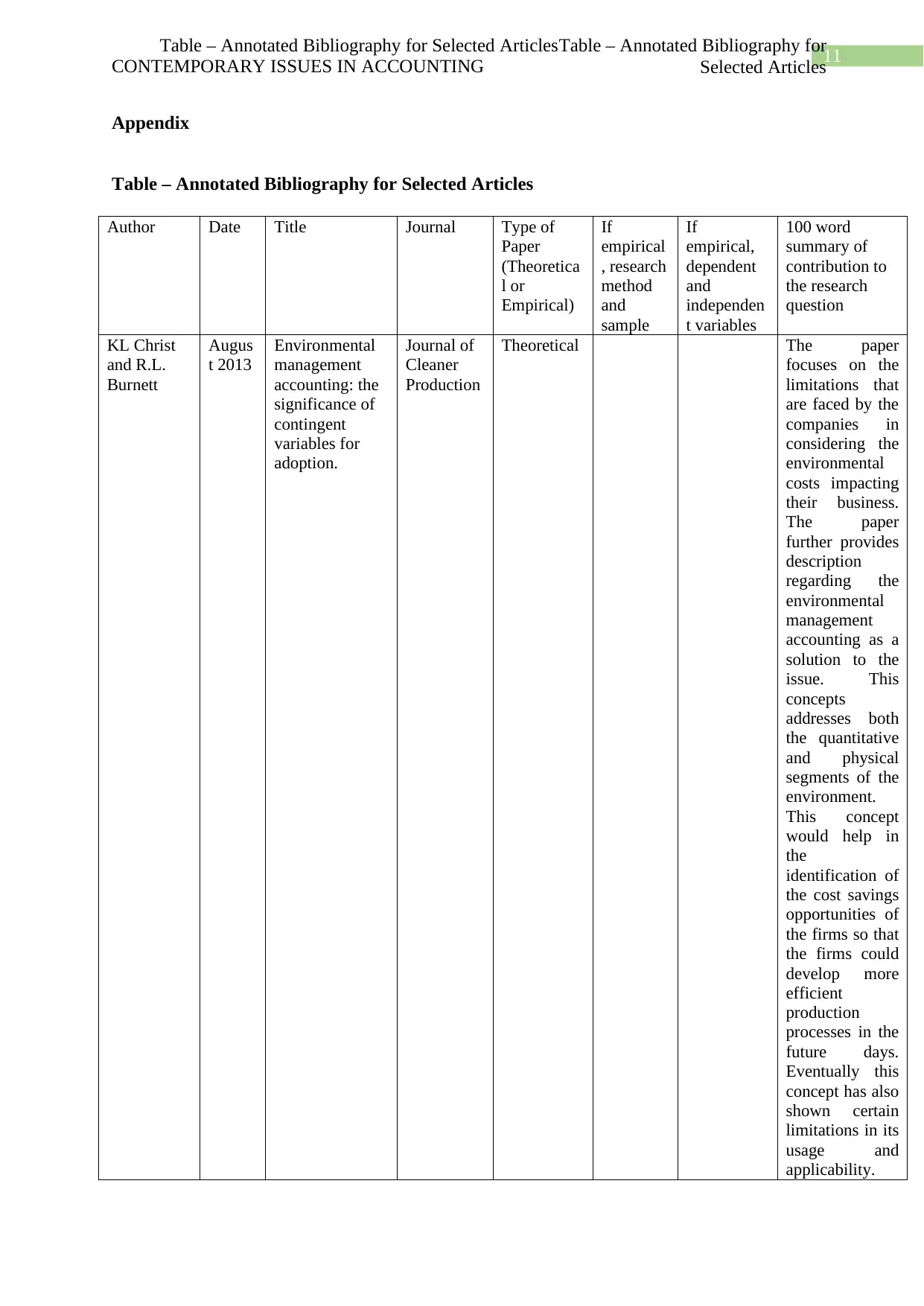
11
Table – Annotated Bibliography for Selected ArticlesTable – Annotated Bibliography for
Selected ArticlesCONTEMPORARY ISSUES IN ACCOUNTING
Appendix
Table – Annotated Bibliography for Selected Articles
Author Date Title Journal Type of
Paper
(Theoretica
l or
Empirical)
If
empirical
, research
method
and
sample
If
empirical,
dependent
and
independen
t variables
100 word
summary of
contribution to
the research
question
KL Christ
and R.L.
Burnett
Augus
t 2013
Environmental
management
accounting: the
significance of
contingent
variables for
adoption.
Journal of
Cleaner
Production
Theoretical The paper
focuses on the
limitations that
are faced by the
companies in
considering the
environmental
costs impacting
their business.
The paper
further provides
description
regarding the
environmental
management
accounting as a
solution to the
issue. This
concepts
addresses both
the quantitative
and physical
segments of the
environment.
This concept
would help in
the
identification of
the cost savings
opportunities of
the firms so that
the firms could
develop more
efficient
production
processes in the
future days.
Eventually this
concept has also
shown certain
limitations in its
usage and
applicability.
Table – Annotated Bibliography for Selected ArticlesTable – Annotated Bibliography for
Selected ArticlesCONTEMPORARY ISSUES IN ACCOUNTING
Appendix
Table – Annotated Bibliography for Selected Articles
Author Date Title Journal Type of
Paper
(Theoretica
l or
Empirical)
If
empirical
, research
method
and
sample
If
empirical,
dependent
and
independen
t variables
100 word
summary of
contribution to
the research
question
KL Christ
and R.L.
Burnett
Augus
t 2013
Environmental
management
accounting: the
significance of
contingent
variables for
adoption.
Journal of
Cleaner
Production
Theoretical The paper
focuses on the
limitations that
are faced by the
companies in
considering the
environmental
costs impacting
their business.
The paper
further provides
description
regarding the
environmental
management
accounting as a
solution to the
issue. This
concepts
addresses both
the quantitative
and physical
segments of the
environment.
This concept
would help in
the
identification of
the cost savings
opportunities of
the firms so that
the firms could
develop more
efficient
production
processes in the
future days.
Eventually this
concept has also
shown certain
limitations in its
usage and
applicability.
⊘ This is a preview!⊘
Do you want full access?
Subscribe today to unlock all pages.

Trusted by 1+ million students worldwide
1 out of 17
Related Documents
Your All-in-One AI-Powered Toolkit for Academic Success.
+13062052269
info@desklib.com
Available 24*7 on WhatsApp / Email
![[object Object]](/_next/static/media/star-bottom.7253800d.svg)
Unlock your academic potential
Copyright © 2020–2026 A2Z Services. All Rights Reserved. Developed and managed by ZUCOL.




